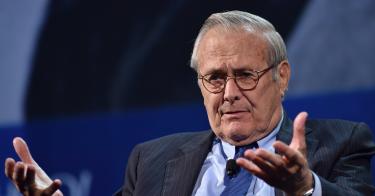Historic figures never outlive those who write their obituaries. A long career in public service—one filled with momentous decisions—guarantees one thing: there will be wildly divergent assessments of that career, each reflecting the beliefs and biases of the person rendering judgment.
This was bound to be Don Rumsfeld’s lot. His career spanned modern memory, from the Reagan era to Trumpian times. The Rumsfeld at the bottom of it all is one worth remembering and emulating.
A fair understanding of a historic figure’s merit parses characteristics from character. A prominent figure’s superficial exterior often makes headlines. It is the moral and ethical qualities, the knowledge and skill underneath that make history.
No career illuminates this truism more than Donald Rumsfeld’s. Before the Iraq War, Rumsfeld was a media darling. His press conferences were packed. Reporters sought interviews as avidly as though they were tickets to a hot Broadway play.
>>> Remembering My Boss, Donald Rumsfeld
After the occupation of Iraq proved messy, the media turned. The Defense Secretary’s glib and blunt leadership-style, which reporters once found charming, was now deemed menacing. The man previously portrayed as model leader was now depicted as Darth Vader.
Times had changed, but not Don Rumsfeld. This explains the divergent interpretations of the man, and obscures much about the leader underneath. To know that man means getting beyond the glib pundits.
The real character of a leader is the sum total of the core skills, knowledge, and attributes he brings to the job and how he uses them. Great leaders are knowledgeable and wise. They have sound critical judgment. And they have a moral center that leads them to make the right decisions for the right reasons. These are the best managers of mayhem, leaders who can lead through difficult and tumultuous times.
Rumsfeld should rank among the most admirable public servants in modern American history. Steven Bucci, his former military aide, recalls him as a force to be reckoned with and a force for good. “Rumsfeld was a controversial figure,” Bucci writes, “mostly because throughout his long and storied career he never suffered fools well, always spoke his mind, and cared far more about serving the nation well than what people thought about him.”
To find the real Rumsfeld, you’ll need to look beyond the headline haters. One good place for insights is Rumsfeld: A Personal Portrait (2003), written by his former speech writer Midge Dector. It’s a useful pre-Iraq War assessment of the man.
Or, you can go right to the horse’s mouth. Rumsfeld penned his own weighty tome, Known and Unknown: A Memoir (2012). There’s also an engaging documentary, “The Unknown Known” (2014), drawn from 33 hours of interviews with Rumsfeld by filmmaker Errol Morris.
None of this is to argue that Rumsfeld had no flaws and made no mistakes. All decisive leaders make mistakes. And long-serving leaders who make the best decisions also make the worst decisions, if only because they make the most decisions.
Some of Rumsfeld’s post-9/11 decisions are debatable. Supporting the choice to simultaneously take on Afghanistan and Iraq was risky. FDR sequenced his wars, pushing for defeating Germany first, and then Japan. The reason was simple: the U.S. couldn’t muster enough combat power to take on both at the same time. Rumsfeld inherited Bill Clinton’s military, which was on the verge on going hollow and not prepared to carry on major protracted combat operations in two places at one time. Rumsfeld pushed to try anyway.
Rumsfeld also risked that the occupation of Iraq would be short and painless. Another misjudgment.
>>> After Rumsfeld: Next Steps for the National Defense
And, to be honest, Rumsfeld’s Pentagon was slow to adapt to the reality that it had rolled the dice and guessed wrong. This left them scrambling to adjust to the realities of the war they had on their hands.
Rumsfeld’s wrong choices were not the product of hubris, malice, aggrandizement, or ambition. They were just strategic misjudgments. Given his resolve, skill and strength of character, if the president had kept him around, Rumsfeld likely would have course-corrected and steered the Pentagon on a better course. We will never know.
What we do know is that, despite the bitter end to his political profession, Rumsfeld remained committed to a career of self-service, developing next-generation leaders through the Rumsfeld Foundation.
Real leaders are not caricatures of right and wrong. Classifying historical figures by cherry-picking their actions just creates cardboard heroes and stock villains.
Don Rumsfeld was human. He made mistakes which, because of his position, had tragic consequences. But he was a man of character and principle, who never failed to do what he thought best for Americans. His was an extraordinary life—one that can teach us about real leadership.
This piece originally appeared in 19fortyfive




